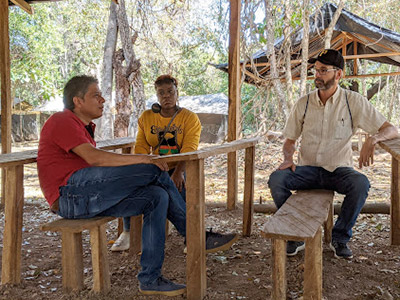The “Inside the PTS Curriculum” series gives you an inside look at what students are learning in their courses at Pittsburgh Theological Seminary. Each article focuses on one class, its subject matter, what students can expect to learn, the required texts, and the kinds of assignments students can expect. We’ll let you know whether the course is required or available for the Master of Divinity (MDiv), the Master of Arts in Pastoral Studies (MAPS), or Master of Theological Studies (MTS). Each article will include the professor’s bio.
This week’s course is: “Intercultural Experiential Learning.”
About Intercultural Experiential Learning
During the January Term, Pittsburgh Theological Seminary students took Intercultural Experiential Learning with the Rev. Dr. Hunter Farrell in the class “Intercultural Experiential Learning.” This course is required for students in the Master of Divinity (MDiv) degree program and is open to students in the Master of Arts in Pastoral Studies (MAPS) and Master of Theology (MTS) degree programs.
Intercultural Experiential Learning is organized in conjunction with the World Mission Initiative/Metro- Urban Institute intercultural learning trips and provides pre-trip orientation in cultural competence and anti-racism, intercultural communication, a theology of short-term mission engagement, area studies for the specific communities to be visited, and spiritual practices for mission. After the trip, students explored personal, cultural, missiological, and theological strategies for reflecting on the intercultural experience. This year students traveled to Colombia and Southwest Florida.
During this class, students come to understand basic concepts in intercultural work: the culture concept, ethnocentricity, cultural competence, racism, white privilege, intercultural communication, and intercultural conflict. They develop a theology of short-term mission and a missiological understanding of the role of a missionary. Further, students develop an understanding of the relationship between context and mission, are exposed to and develop spiritual practices drawn from the experiences of the global church, and learn how to lead a short-term mission trip. Throughout the course, students also identify needs and assets through the lens of mutuality.
In addition to a number of articles, students read Homegoing by Yaa Gyasi, Mission Trips that Matter: Embodied Faith for the Sake of the World by Dan Richter, and Whistling Vivaldi: How Stereotypes Affect Us and What We Can Do by Claude Steele. Assessment is based on readings and written reflections, trip journaling, participation in an intercultural immersion experience, and class presentation on lessons learned during the intercultural immersion experience and application to local ministry.
About the Instructor
The Rev. Dr. Hunter Farrell assumed his position at Pittsburgh Seminary in 2017 after serving as director of World Mission for the Presbyterian Church (U.S.A.) in Louisville, Ky. His mission leadership and service spans more than three decades. In his years as World Mission director, Farrell managed a 180-member staff in 52 countries while overseeing the areas of strategic direction and partnerships, funds development, operations, and communications. Earlier, as a Presbyterian mission co-worker in Peru, he organized and accompanied an international network of churches, non-profit organizations, and universities that linked social capital in Peru and the U.S. to address issues of poverty and justice. And while working with World Mission in East and West Africa, he supervised the work of mission workers in seven African nations in programs of health, development, evangelism, education, and theological education. He also taught in the Republic of Zaire—now the Democratic Republic of Congo.

